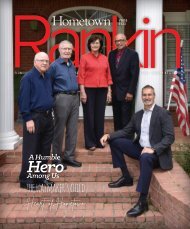Clinton1121web
You also want an ePaper? Increase the reach of your titles
YUMPU automatically turns print PDFs into web optimized ePapers that Google loves.
PORTRAIT OF A
Veteran’s
LifeBethany Cole
In the Brookdale Senior Living Center, here in Clinton,
there is a collection of photographs in the main hall -
a grouping of photos featuring veterans who live in
the center. On the far end is a picture of one particular
veteran, John McNeece. His life, like many others on
the wall, is a unique ode to years lived in service to
his country, sacrifice for the greater good, and an
accumulation of adventurous memories.
THE EARLY YEARS
His story began in Fulton, Mississippi,
where he was born in 1931, on what
he describes as a “red dirt road cotton
farm.” He spent his childhood and
adolescence in Fulton, as one of six
boys. In the 1940s, as young men
across the U.S. enlisted to serve in
WWII, McNeece decided he wanted
to follow suit. Four of his six brothers
served in WWII at one time. He
registered for the draft, however the
war concluded before he reached
18 years old. But when the Korean
War dawned in the 1950s, similarly
drawing American men into service
(including a brother of his) McNeece
made the decision to serve his country
in a different way than he initially
envisioned. In November of 1951,
he opted to join the Air Force.
He enlisted in Tupelo, beginning a
decades-long career of service.
A CAREER
Following initial enrollment,
McNeece was then transferred to
Louisiana, where he became a KP
(“kitchen patrol”), which, he laughingly
says, “Was not what I wanted to do.”
He transferred out to Wichita Falls,
Texas, where he began aircraft and
engine training. He went in to school
for about a year, learning everything
he could about the B36 engine, which
was, according to him, “his area.” He
followed his stint in Wichita Falls with
time at the (now former) Carswell Air
Force Base, where he invested time
learning about a range of engines,
and became a mechanic on the B36’s
carrying nuclear weapons.
The ensuing years of his career
encompassed working on airplanes
and missiles that carried “nukes.”
McNeece served in multiple areas
across the U.S. The high point,
according to him, was time he spent
in Blytheville, Ark. Around the 12-year
mark of his career, he says, “I went
back to school yet again” in Spokane,
Wash., to work on the SM-65E “Atlas-E”
missile (he was a technical sergeant
at this juncture). He stayed there for
about a year before re-entering school
to obtain training on the famous
Minuteman missile. He subsequently
moved to North Dakota for four years.
His years there, were, by his account,
extremely difficult due to the frigid
winters. As he says, “We worked one
night in -16 degree weather, trying to
dial locks without gloves on our fingers.
People froze to trucks.” He recalls
his time in North Dakota as his least
favorite of his entire career, as his
childhood in the deep south and
young adulthood in Texas had hardly
prepared him for such dire weather.
While the majority of McNeece’s
career kept him on U.S. soil, the latter
years eventually provided the
opportunity for overseas travel. After
moving up to the title of senior master
sergeant, which meant he covered
all missiles, he was assigned to the
Philippines. He says that the best
experience of his career, where he
truly felt as though all his accumulated
knowledge came to bear fruit, was
during those years. “We were in trouble
one time,” he said. “In one situation,
the test gear was rusted.” However,
McNeece solved the problem. “That
moment,” he said, “was my greatest
achievement.” It was during this time
that he was named the director of
missile maintenance for Southeast
Asia, a title he carried until he finished
his service.
THE LIFE
While McNeece loved his career,
he candidly acknowledges the
challenges that accompanied it.
“It was difficult learning to live without
a wife while away,” he said. “That is
hard on a family.” However, when
reflecting on his family now, and how
his three children (two boys and a girl)
have grown up, he shows deep fatherly
pride. The military also provided him
with opportunities to make and keep
deep relationships with those he
served alongside; in recounting years
past, he named a particular superior,
Jerry Fall, who ultimately gave him
his master sergeant stripes, as one
of the most influential commanding
officers he had, and also, one of his
good friends with whom he kept up
throughout the years.
While any long-term occupation
provides one with an opportunity to
fully scrutinize the changes that might
need to be made, or the benefits and
drawbacks, McNeece says he has few
complaints. “The divisions between
enlisted and officer grades could have
changed,” he notes. “And maybe the
pay,” he adds ruefully, with a smile
and chuckle. Pay and divisions aside,
McNeece says he ultimately could
not have imagined anything different.
“In the early years of my career, I would
take a slot on a flight once or twice a
month, which would fly along the
U.S. and Canada border, with possible
orders to hit Russia. You got paid extra
if you went on those flights. It was a
daunting experience for an old farm
boy.” He paused, his eyes welling with
tears, “But I would do it all over again.”
10 • NOVEMBER 2021

















